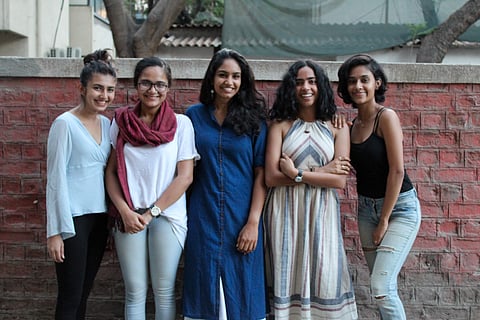

Puberty is defined as the period during which growing boys and girls undergo the process of sexual maturation. In India, it is commonplace to announce when a child hits puberty, especially when it’s a girl. Her first period becomes a reason for celebration in her family. But from that point on, everything will be different. Every period that follows will be one where she is ostracised for those five long days, often kept locked away from family and friends. “What’s contradictory is that we celebrate childbirth but when the same blood, which would normally provide nourishment to the growing child, is shed every month as our periods, we consider it impure and deem talking about it a taboo,” says Anjali Dalmia, one of the co-founders of The Project Amara.
This initiative was started in 2016 by Aahana Mehta, Surabhee Arjunwadkar, Reva Patwardhan, Sayuri Deokar and Anjali when they were in the eleventh grade. The five of them — who are now in their early 20s and college-goers — joined DriveChange Learning and Resource Centre (DLRC), an educational institution in Pune, for their higher secondary studies. As part of the school’s Social Impact Project, they were required to take up a social issue that bothered them. The Project Amara was a result of that. “We all knew that we wanted to do something for women and the environment. And we did. Now wherever we go, we try to raise awareness about menstruation and encourage menstruators to take ownership of their bodies and also promote sustainable menstruation — this has always been the essence of what we do,” says Aahana. The group refers to people as menstruators and non-menstruators because, “this is beyond gender — not all women menstruate and not all menstruators are women,” explains Anjali.
The virality of it all
I first came across the platform’s Instagram page and, subsequently, their website when I was getting my daily fix of late-night Insta Reels videos. This one video of a young girl drawing attention to period commercials stood out. In the short video, she calls out major sanitary napkin brands for using a blue liquid to indicate menstrual blood. Why is this a problem? Because, according to the video, ‘not showing menstrual discharge in its true form and colour encourages the idea that it is impure’. And the number of ‘Exactly!’-s and ‘We bleed red!’-s this viral video, which has over 25k likes, has received so far is proof that they are speaking up for young India. “We have always hated these menstruation ads because of how strongly they sanitise the experience of menstruation,” says a rather annoyed Aahana who manages the platform’s social media accounts.
Although they are new to Reels, they aren’t new to doing videos especially on topics like ‘How many types of period products are available?’, ‘How many pads in a month?’ and ‘What is PMS?’. They also bust common myths on their page as well as give details of the different sessions they hold, both virtually and physically. The group is also passionate about sustainable menstruation. “The way these sanitary napkins are portrayed in ads, a lot of people from villages and small towns believe that these are life-changing and it really digs into their pockets to buy them. And it is really unfair because they don’t know what is happening to their bodies when they use such chemical-laden products,” says Aahana, who adds that acceptance of menstruation is still a distant idea for many.
Schooling ‘em the right way
For the past four years, the group has been conducting awareness sessions in not only urban slum areas but also colonies, societies, schools, colleges and villages. Talking about these sessions, Surabhee says, “In a typical session, we talk to our audience about what menstruation is and the taboos that surround it, what’s in a pad so that we know what we’re consuming and how it affects the environment, and the cheaper and more sustainable alternatives one can opt for.” While the primary audience is menstruators, they have held sessions for non-menstruators too. So why do they feel it is important for everyone to talk about menstruation? “Menstruation is being used as a tool of oppression, as a tool of suppression, it’s a health issue, a gender issue — there are so many things tied to it and they need to be addressed whether or not you menstruate,” avers Anjali.
Besides a detailed background on the co-founders, the initiative and their sessions, their website — theprojectamara.wordpress.com — also contains a list of sustainable products that one can consider. But do they vouch for them? “We have tried all the brands — from menstrual cups to cloth pads — that we’ve mentioned on our site and our parents have too. We found some to be good and some not so good. So, we have been able to give our honest opinions,” chimes in Reva. Today, more and more menstruators worldwide are choosing sustainable products as they are better for the body (because they are chemical-free) as well as for the environment.
Going way beyond
With the co-founders being so young, I couldn’t help but wonder what the future of the platform could likely be. Well, the group would like to build more sessions for non-menstruators and not just in places where they are comfortable talking about it. They also hope to grow their existing network of interns and volunteers so that these sessions can be carried out across the country in regional languages as they currently are limited to sessions in Hindi, Marathi and English in the state of Maharashtra. To be able to make a change at the policy level one day is another goal on the top of the list for this group that’s clearly doing their best to ensure young India has a stigma-free future.
